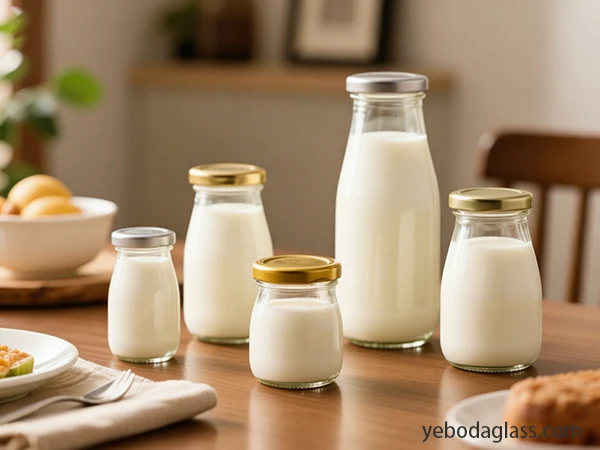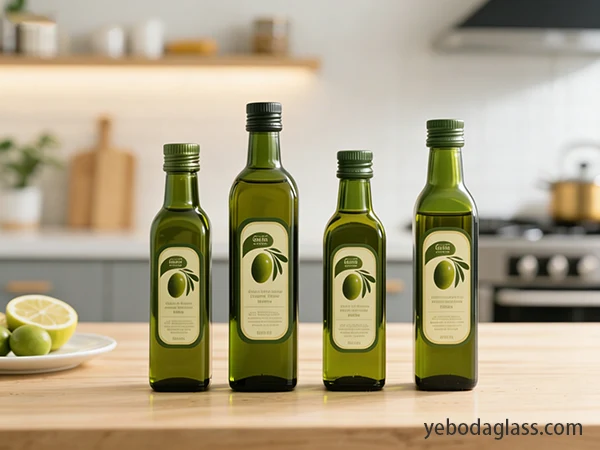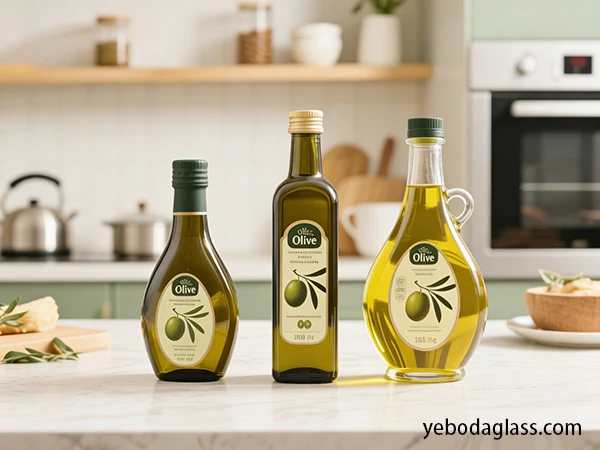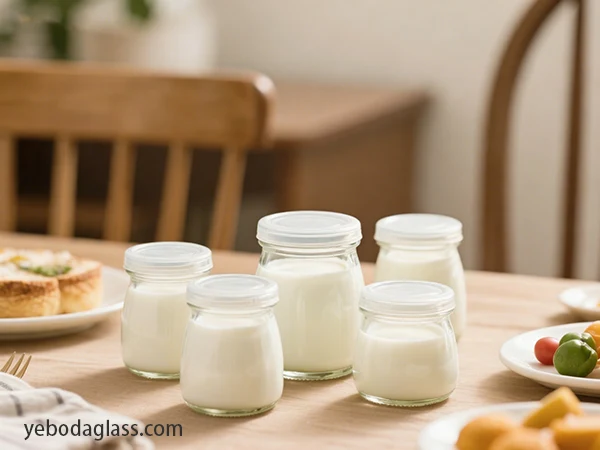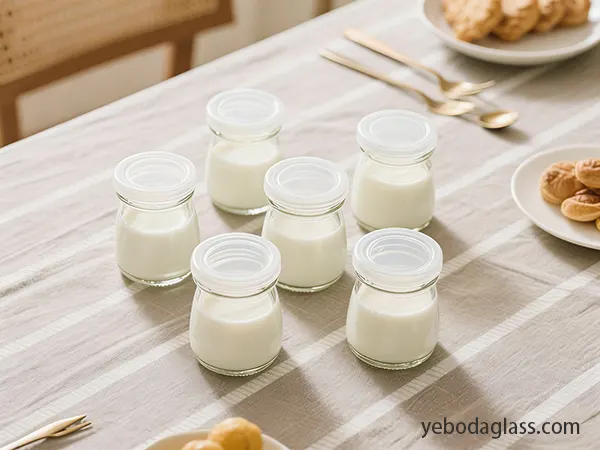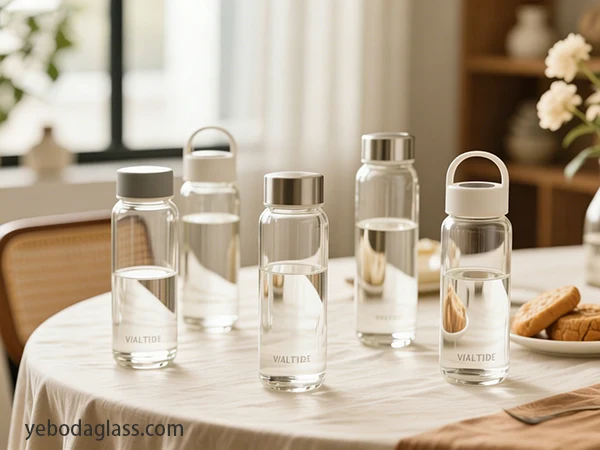Úvod
Efektivní akvizice lahve s olejem ve velkém je jedním z problémů, které mohou vést k významné změně zisku, image značky a také k ovlivnění každodenního provozu společnosti na dnešním trhu s obaly na oleje, který je poměrně konkurenční. Společnosti, které dokáží efektivně zefektivnit své nákupy skleněné lahve a zároveň si udržet kvalitu a cenu ve svůj prospěch a stát se vítězi na trhu. Řada produktů, od olejů místních řemeslníků až po oleje velkých distributorů, může mít tak obrovský vliv na ceny a dodávky skleněných lahví na olej, že schopnost kontrolovat dodavatelské řetězce lahví na olej ve velkém může vést k menšímu plýtvání, bezproblémovému provozu společnosti a asertivnějšímu postavení na trhu. Výhody, které lze získat s pomocí kvalifikovaných zdrojů pro uspokojení vašich požadavků na lahve na olej ve velkém, jsou dobrým příkladem typu dodavatelů, které lze vyjmenovat jako YebodaSkleněné lahve na olej ve velkém balení, které nabízí Yeboda, způsobují méně problémů v automatizovaných plnicích linkách a také minimálně ovlivňují dodávky těchto produktů, protože ty se vyznačují zvýšenou úrovní průhlednosti, konzistence a robustnosti. Nejde jen o správný výběr lahví na olej ve velkém balení, který pomůže stabilizovat jedlé oleje, esenciální oleje a průmyslové oleje, ale je to také dobrý způsob, jak informovat spotřebitele o kvalitě značky. Díky hromadnému nákupu lahví na olej od důvěryhodného dodavatele, jako je Yeboda, budou společnosti schopny být konzistentní, snižovat jednotkové náklady a udržovat si efektivní provoz.
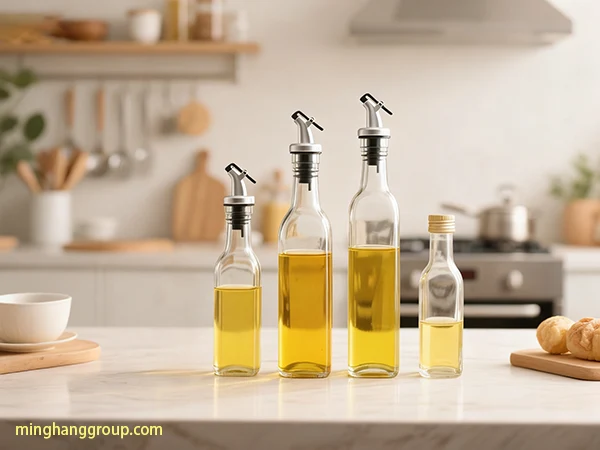
Definování vašich potřeb
Implementace úspěšné a robustní strategie hromadného nákupu lahví na olej začíná pochopením a nastíněním provozních potřeb vaší firmy. Společnost by měla určit typ oleje, materiál lahví, design, kapacitu a rozsah provozu. Tato rozhodnutí ovlivní výběr dodavatelů, náklady na dopravu, balení a obecně plynulost velkoobchodních dodavatelských řetězců.
Segmentace podle odvětví
- Kosmetika a osobní péče: Pleťové vody, šampony, dezinfekční prostředky – vzhled a přesnost dávkování jsou nejdůležitějšími faktory.
- Jídlo a nápoje: Omáčky a dresinky potřebují uzávěry, které jsou bezpečné pro potraviny a snadno se nalévají.
- Čisticí prostředky: Víčka, která jsou pevná a odolná vůči rozlití, zajišťují bezpečnost.
- Léčiva: Prvky, které prokazují neoprávněnou manipulaci a jsou bezpečné pro děti, zajišťují shodu s předpisy.
Typ oleje a jeho vliv na výběr lahve
Chemické a fyzikální vlastnosti vašeho oleje by měly být faktorem, který ovlivňuje materiál a design lahví. Použití nesprávného typu skla pro určité oleje může způsobit jejich znehodnocení, chemické reakce nebo ztrátu důvěry spotřebitelů.
Jedlé oleje (olivový olej, rostlinný olej, oleje na vaření)
- Požadavky: Lahve musí být certifikované pro potravinářskou použití, musí být vyrobeny z inertního materiálu a pro zachování čerstvosti a chuti by měly nabízet ochranu před UV zářením. Pro barevnou prezentaci oleje je vhodná buď čirá, nebo tónovaná skleněná láhev.
Úhel pohledu na produkt:
- Sklo, PET a někdy HDPE pro velké nádoby. Sklo je rozhodně nejlepší materiál pro luxusní výrobky.
Esenciální olej (levandule, čajovník, máta peprná)
- Požadavky: Produkt musí být velmi inertní, měl by být chráněn před UV zářením a při dávkování musí být velmi přesný. Většinou se takové produkty dají sehnat v omezeném množství (5–100 ml).
- Možnosti materiálu: Dřevo skleněných nádob má obecně buď jantarovou, nebo kobaltově modrou barvu. Je nezbytné pro ochranu před UV zářením a udržení chemické stability.
Průmyslové oleje (maziva, rozpouštědla, čisticí prostředky)
- Požadavky: Produkt by měl být chemicky odolný, vyroben z pevného a odolného obalu a kromě velkého objemu by měl mít také bezpečnostní uzávěry. Ochrana před UV zářením je považována za méně důležitou vlastnost.
- Možnosti materiálu: HDPE a PET jsou levné a mají dlouhou životnost.
Automobilový olej (motorový olej, převodová kapalina)
- Požadavky: Výrobek by měl být extrémně pevný a odolný vůči působení chemikálií. Kromě toho by měl mít ergonomický design pro usnadnění nalévání a bezpečnostní prvky proti neoprávněné manipulaci.
- Možnosti materiálu: Většinou se používá HDPE, který je dobrý z hlediska chemické odolnosti a snadné manipulace.
Specifikace lahve: Materiál, objem a design
Materiály lahví
Sklo
- Výhody: Sklo je chemicky inertní, z prémiového hlediska vypadá skvěle, lze ho donekonečna recyklovat a nabízí dobrou UV ochranu. Je nezbytností pro velmi citlivé oleje.
- Pohodlí: Sklo je křehké, těžší než jiné materiály a dražší.
Skleněné lahve na olej Yeboda ve velkém: Velkoobjemové objednávky prostřednictvím společnosti Yeboda zaručují jednotnost. Jejich velkoobjemové skleněné lahve na olej jsou navrženy tak, aby usnadňovaly automatizaci, snižovaly riziko rozbití a splňovaly normy pro potravinářskou a chemickou inertnost. To vše je obzvláště cenné, když hledáte efektivní způsob, jak škálovat své velkoobjemové objednávky.
PET (polyethylentereftalát)
- Výhody: PET je lehký materiál, který se sotva rozbije, je průhledný a zároveň se jeho výroba vyznačuje nízkou cenou.
- Nevýhody: Materiál není úplnou bariérou pro UV záření a časem mírně reaguje.
HDPE (polyethylen s vysokou hustotou)
- Výhody: Materiál je vysoce odolný vůči široké škále chemikálií, je pevný, neprůhledný a představuje velmi ekonomické řešení, pokud je vyžadován velký objem výroby.
- Nevýhody: Má méně atraktivní vzhled, jelikož je to neprůhledný materiál, není na něm vidět produkt.
Hliník
- Výhody: Kov je lehký, nerozbitný, má moderní a atraktivní vzhled, poskytuje dobrou UV ochranu.
- Nevýhody: Výrobek se snadno promáčkne a existuje možnost reakce kovu s kyselými oleji.
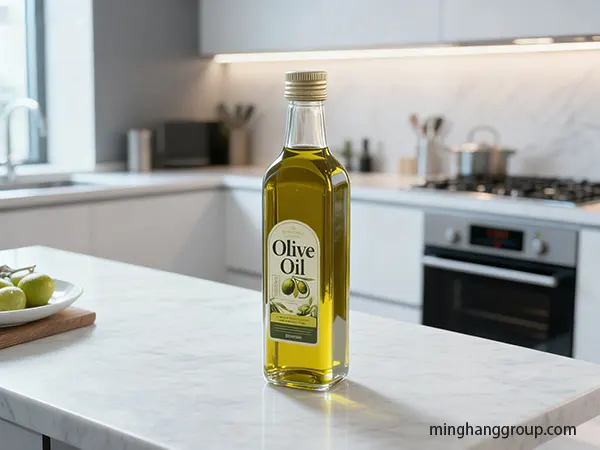
Kapacity
Produkt lze prezentovat v nádobách o objemu od 100 ml do 5 litrů nebo i více. Pokud jsou lahve malé, je nutné je velmi pečlivě zabalit, aby se zabránilo jejich poškození; na druhou stranu, větší lahve musí být dobře navrženy z hlediska manipulace a přepravy.
Design a estetika
Vzhledem k dané funkčnosti, tvaru, barvě a oblasti označování produktu bude určovat identitu značky. Je možné si nechat vyrobit formu na míru, ale zároveň bude minimální objednávkové množství a počáteční investice vyšší.
Provozní rozsah
Provozní rozsah ovlivňuje formování strategií získávání zdrojů:
- Malé podniky: Jedná se o situace s menšími objemy, ve kterých by podniky byly flexibilnější a s nižšími minimálními objednanými množstvími (MOQ).
- Velcí výrobci: Obvykle se jedná o automatizované linky s velkým objemem výroby, které mohou využívat přímých spojení s výrobci, dlouhodobých smluv a přerušení dodávky velkého množství.
- Distributoři: Jedná se o rozmanité řady produktů, a proto vyžadují elastické sourcing a efektivní správu skladu.
Strategické získávání zdrojů a výběr dodavatelů pro velkoobchod s lahvemi na olej
Rozhodnutí o strategickém získávání lahví na olej ve velkém by se nemělo omezovat pouze na zvážení ceny. Velmi důležité je také to, aby dodavatelé byli schopni dodávat kvalitní skleněné lahve ve velkém množství.
Identifikace potenciálních dodavatelů
Potenciální dodavatele lze identifikovat pomocí těchto zdrojů:
- Online tržiště: Alibaba, Thomasnet a globální zdroje.
Veletrhy: PACK EXPO, INTERPACK
- Průmyslová sdružení a doporučení: Jde o společnosti, které vám mohou poskytnout dodavatele, kteří již byli prověřeni.
- Faktor lokality: Zatímco místní dodavatelé vám mohou poskytnout výhodu rychlejšího dodání, zahraniční dodavatelé vám mohou nabídnout nižší cenu za jednotku. Nejlepším řešením je často kombinace obojího.
Kritéria pro výběr dodavatele:
- Zajištění kvality: Certifikace ISO, shoda s FDA, testování materiálů.
- Ceny a množstevní slevy: Hromadný nákup, stupňovité ceny.
- Spolehlivost: Včasné dodání, efektivní zpracování produktů a komunikace.
- Postupy udržitelnosti: Využití obnovitelných zdrojů energie ve výrobě, využití recyklovaných materiálů ve výrobě, opětovné využití výroby.
- Finanční stabilita: Aby byla zajištěna nepřetržitá dodávka.
- Minimální objednávka: Mělo by odrážet rozsah provozu společnosti.
Budování silných vztahů s dodavateli
Bezproblémový hromadný nákup lahví s olejem je podpořen transparentními smlouvami, provozem podpořeným klíčovými ukazateli výkonnosti (KPI), důvěrou a pohotovostními plány.
Strategie optimalizace nákladů pro velkoobjemové dodávky olejových lahví v celém dodavatelském řetězci
Optimalizace nákladů neznamená pouze snížení jednotkové ceny. Celý dodavatelský řetězec má významný vliv na konečnou cenu lahví s olejem při nákupu ve velkém.
Optimalizace logistiky přepravy
- Konsolidace nákladu: Konsolidací částečně plných nebo plně naložených zásilek kamionů můžete ušetřit na nákladech na dopravu.
- Optimalizace trasy: Zkrácení, úspora paliva a úspora času cesty jsou hlavními cíli této práce.
- Optimalizace balení: Kromě úspory prostoru v balení zajišťuje použití palet, dělicích příček a vložek také to, že skleněné lahve jsou pevně zabalené a chráněné.
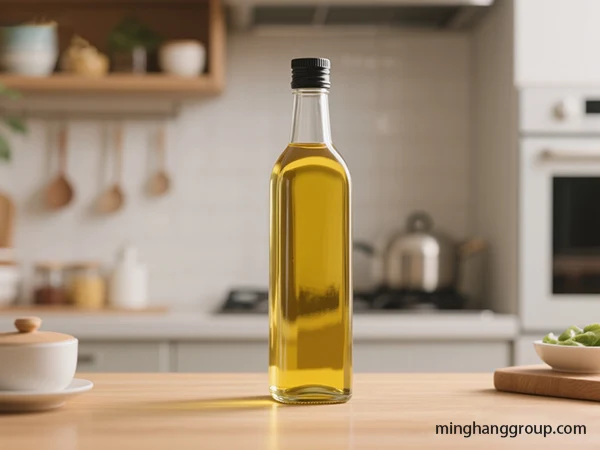
Snížení nákladů na skladování
- JIT Inventory: Je to strategie, která umožňuje firmám držet ve skladech pouze nezbytné množství zásob.
- Cross-docking: Jedná se o činnost, při které jsou produkty předávány přímo z vozidla dodavatele do vozidla společnosti bez nutnosti skladování nebo manipulace ve skladu.
- Inventář konsignace: Obchod kompenzuje dodavateli pouze prodané produkty, nikoli za veškeré přijaté zásoby.
Zmírnění finančních rizik plynoucích z míry poruchovosti
Bezpečné sekundární/terciární balení, pečlivé zacházení a pojištění jsou některé z metod, jak pokrýt ztrátu. Jedním ze způsobů, jak snížit riziko rozbití, je nákup kvalitních skleněných lahví na olej ve velkém množství od spolehlivých dodavatelů.
Zvyšování efektivity dodavatelského řetězce a logistiky
Efektivita je hlavním rysem, který definuje úroveň reaktivity a celkové operativnosti společnosti.
Efektivní správa zásob
Zásoby by měly být efektivně řízeny prostřednictvím přesného předpovídání poptávky, optimalizace bezpečnostních zásob a sledování obratu zásob.
Optimalizace dopravních tras
Zavedení multimodální dopravy, konsolidace nákladu a sledování GPS povede k menšímu počtu zpoždění a větší konzistenci dodávek.
Zajištění kompatibility lahví s plnicími linkami
Společnost se může zbavit prostojů výrobní linky tím, že bude mít k dispozici přesné podrobnosti, bude testovat vzorky a bude úzce spolupracovat s dodavateli.
Zavádění opatření ke snížení lomu
Mezi metody, jak snížit riziko poškození, patří automatizovaná manipulace, kontroly kvality, školicí programy zaměstnanců a senzory monitorující otřesy.
Využití technologií pro optimalizaci dodavatelského řetězce
S pomocí ERP, WMS, senzorů IoT a technologie blockchain mohou organizace dosáhnout větší viditelnosti, sledovatelnosti a efektivity svých operací.
Řešení s prázdnými vs. předplněnými lahvemi: Srovnávací analýza
Získávání prázdných lahví
Hlavními výhodami sběru prázdných lahví je větší flexibilita při plnění, lepší kontrola nad produktem a potenciál úspory nákladů. Zároveň to vyžaduje existenci vlastní infrastruktury.
Získávání předplněných lahví
Zjednodušuje dodavatelský řetězec, snižuje pracovní zátěž provozního týmu a umožňuje rychlejší cestu na trh. V případě velkého objemu budou jednotkové náklady vyšší.
Rozhodovací faktory
Rozhodnutí mezi prázdnými nebo předplněnými lahvemi na olej ve velkém množství lze provést s ohledem na objem, infrastrukturu, kontrolu kvality a provozní priority.
Zajištění kvality a shoda s předpisy pro velkoobjemové lahve s olejem
Certifikace materiálů
Bezpečnost a shoda materiálů s předpisy je zajištěna normami FDA, předpisy EU pro kontakt s potravinami, USP, ISO, RoHS a použitím plastů bez BPA.
Protokoly kontroly kvality
Mezi opatření kontroly kvality, která lze přijmout, patří inspekce, testování šarží, audity dodavatelů, odběr vzorků a ověření správného uzávěru.
Relevantní regionální regulační rámce
Mezi oblasti, které regulační rámce pokrývají, patří označování, systémy rozšířené odpovědnosti výrobce, environmentální předpisy, pravidla dovozu/vývozu a zákony na ochranu spotřebitele.
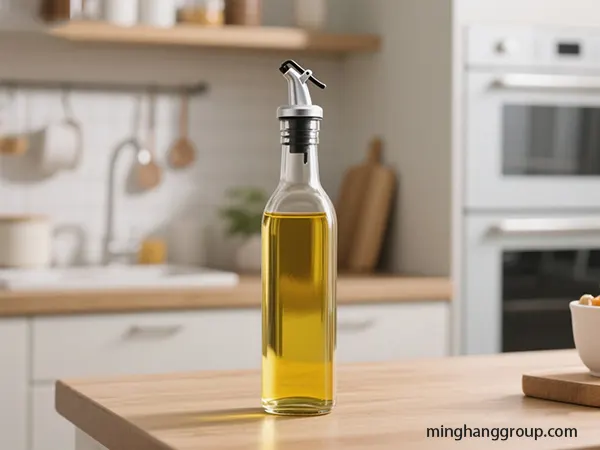
Závěr a doporučení
Aby společnost dosáhla úspěchu v optimalizaci hromadného nákupu lahví na olej, měla by zahrnout strategické plánování, zajištění kvality a zavedení procesu neustálého zlepšování. Doporučení k provedení prací:
- Proveďte komplexní posouzení potřeb.
- Proveďte analýzu celkových nákladů na vlastnictví (TCO).
- Podívejte se na výhody a nevýhody prázdných a předem naplněných roztoků.
- Implementujte strategie s více dodavateli.

